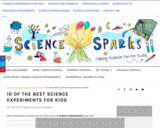
10 of the BEST Science Experiments for Kids
- Subject:
- Education
- Elementary Education
- Physical Science
- Material Type:
- Activity/Lab
- Author:
- Emma Martin
- Emma Vanstone
- Date Added:
- 02/01/2023

10 of the BEST Science Experiments for Kids

Details: This lesson can be added to the Amplify first grade science unit: Animal and Plant Defenses: Spikes, Shells, and Camouflage. It can also be used with any unit on animal defenses and structures.Amplify Chapter 3 Driving Question: How can Spruce the Sea Turtle’s offspring survive where there are sharks? Pursuit addressed:Toward the pursuit of Skills: Students participate in a class reading of an informational text. Students use the information outlined in the text to develop their knowledge of plastic pollution and its negative impact on sea turtles and the environment. They then use this knowledge to inform others or take other steps to help with reducing plastic pollution.Toward the pursuit of Intellect: In this lesson students learn about a topic that affects the environment and specifically how plastic waste affects sea turtles which they have been studying. They can better understand an environmental problem and turn their understanding into action.
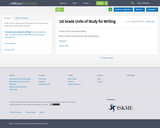
Grade 1 Unit 2: Information Writing
Bend 1: Writing Teaching Books with Independence
Session 4
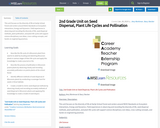
This unit focuses on the diversity of life at Hartje School Forest and centers around NGSS Standards on Ecosystem Interactions, Energy and Dynamics. Field experiences in observing and recording the diversity of life, seed dispersal methods, plant pollination, and plant life cycles will support science disciplinary core ideas, cross-cutting concepts, and hands-on engineering practices.
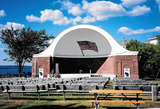
This task helps children explore multidigit computation with arrays and/or repeated addition.

Overview: Students will review how to use Google Docs and type their final draft. Students will also learn how to insert a picture into a Google Document to support their opinion. In addition, students will share their writing using an author’s chair. Student writing will then be hung in the hallway.W.3.1: Write opinion pieces on topics or texts, supporting a point of view with reasons. I can write an opinion piece and support my opinion with reasons.

Overview: Students will begin to explore opinion pieces by reviewing the difference between a fact and opinion.Building Into W.3.1: Write opinion pieces on topics or texts, supporting a point of view with reasons.Building Into: I can write opinion pieces and support my opinion with reasons.

Overview: Students will brainstorm and then choose a topic for their opinion paper. Students will then brainstorm a list of reasons that support their topic.Building Into W.3.1: Write opinion pieces on topics or texts, supporting a point of view with reasons. (I can write opinion pieces and support my opinion with reasons.)W.3.1b: Provide reasons that support the opinion. (I can provide reasons that support the opinion.)

Overview: Students will craft a strong opinion using the topic they chose on Day 2, the list of reasons they brainstormed on Day 2, and the stoplight model.W.3.1: Write opinion pieces on topics or texts, supporting a point of view with reasons. (I can write an opinion piece and support my opinion with reasons.)W.3.1a: Introduce the topic or text they are writing about, state an opinion, and create an organizational structure that lists reasons. (I can introduce a topic by stating an opinion and using an organizational structure to list reasons.)

Overview: Students will use the OREO strategy to outline their opinion paper. Outlines will include the students opinion statement, 3 reasons, and an example or detail for each reason.W.3.1: Write opinion pieces on topics or texts, supporting a point of view with reasons. (I can write an opinion and support my opinion with reasons.)W.3.1b: Provide reasons that support the opinion. (I can provide reasons tht support my opinion.)

Overview: Students will write the introduction to their opinion paper. Students will choose a strategy to hook their reader and then rewrite their opinion statement as their introduction statement.W.3.1: Write opinion pieces on topics or texts, supporting a point of view with reasons. (I can write an opinion piece and support my opinion with reasons.)W.3.1a: Introduce the topic or text they are writing about, state an opinion, and create an organizational structure that lists reasons. (I can introduce a topic by stating an opinion and suing and organizational structure to list reasons.)

Overview: Students will write the body of their rough draft following their OREO prewriting page and transition words and phrases.W.3.1: Write opinion pieces on topics or texts, supporting a point of view with reasons. I can write opinion pieces and support my opinion with reasons.W.3.1b: Provide reasons that support the opinion. I can provide reasons that support the opinion.W.3.1c: Use linking words and phrases (eg. because, therefore, since, for example) to connect opinion and reason. I can use linking words and phrases to connect opinions and reasons.

Overview: Students will finish drafting their rough drafts by adding a concluding statement.W.3.1: Write opinion pieces on topics or texts, supporting a point of view with reasons. I can write opinion pieces and support my opinion with reasons.W.3.1d: Provide a concluding statement or section. I can provide a concluding statement

Overview: Students will use COPS and the focused edit strategy to practice editing and then edit their opinion paper.W.3.1: Write opinion pieces on topics or texts, supporting a point of view with reasons. I can write opinion pieces and support my opinion with reasons.W.3.5: With guidance and support from peers and adults, develop and strengthen writing as needed by planning, revising, and editing. (Editing for conventions should demonstrate command of Language standards 1-3 up to and including grade 3 here.) I can develop and strenghten my writing by planning, revising, and editing with the help of my peers and an adult.

Overview: Students will use a focused revising choice board to guide peer writing conferences. The teacher and students will use a focused revising choice board to guide teacher writing conferences.W.3.1: Write opinion pieces on topics or texts, supporting a point of view with reasons. I can write an opinion piece and support my opinion with reasons.W.3.5: With guidance and support from peers and adults, develop and strengthen writing as needed by planning, revising, and editing. (Editing for conventions should demonstrate command of Language standards 1-3 up to and including grade 3 here.) I can develop and strengthen my writing by planning, revising, and editing with the help of my peers and an adult.

This is the outline for a third grade writing unit on writing opinion (persuasive) papers. The lessons and materials are linked to the outline, but they also uploaded in a PDF format as sperate lessons in WISELearn.
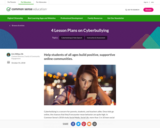
Lessons on this topic teach students about the effects of digital drama, cyberbullying, and hate speech on both themselves and their larger communities. Students explore how individual actions -- negative and positive, intentional and unintentional -- can affect their peers and others. They're encouraged to take the active role of upstander and build positive, supportive online communities, and they will learn how to cultivate empathy, compassion, and courage to combat negative interactions online.
Even though young kids aren't online yet, early lessons on cyberbullying can easily connect to the social and emotional skill-building that happens during early elementary school. By focusing on empathy and compassion, conversations about cyberbullying can give young kids a foundation for future positive online experiences. For older kids, teachers can help students reflect on their own behavior and build strategies for how to respond when they witness cyberbullying.
Introduce cyberbullying in your classroom with one of these four essential lessons, each of which can be modified for use in slightly older or younger grades:
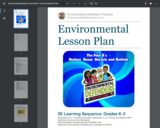
This resource is a lesson plan focusing on teaching the 4 R's - Reduce, Reuse, Recycle, Rethink. This lesson aims to demonstrate how an understanding of these 4 R's can play an important role in conservation efforts. Also that there many different things everyone can do to incorporate the 4 R's into your life. This lesson plan includes the objectives, standards, teacher background information, time guide, material list, literacy books, vocabulary, directions, and resouces.
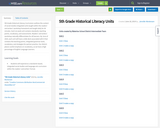
5th Grade Historical Literacy Curriculum outlines the content of social-studies integrated units taught within the readers' and writers' workshop framework and taught daily for 90 minutes. Each six week unit contains standards, teaching points, vocabulary, and assessments. Readers' and writers' workshop naturally differentiates for all learners. By June of 2020, each unit will have a slide deck associated with it that contains the teaching points, integrated grammar work, vocabulary, and strategies for partner practice. Our district places careful emphasis on vocabulary, as we have a high percentage of English Language Learners.
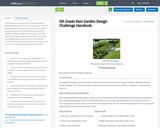
These handouts accompany the 5th Grade Rain Garden Design Challenge Lesson Plan. The handouts give criteria for identifying areas of erosion and non-point source pollution entering waterways on school property, slope and soil suitability criteria for situating the rain garden, and data collection procedures for phosphate testing. The handouts also include guidelines and criteria for the final poster presentation design and Claim-Evidence-Reasoning, as well as rubrics for scoring and guidelines for peer feedback.